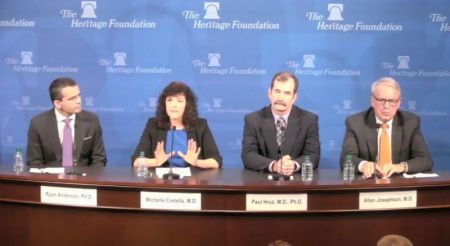Doctors Describe Dangers of Puberty Blockers Used on Children That LGBT Activists Don't Tell

WASHINGTON — Many children and families struggling with gender dysphoria are not receiving the facts about the permanent consequences associated with "experimental" puberty-blocking and sex-reassignment treatments, nor are they being told that justification for such treatments are not backed by strong scientific evidence, doctors warned Wednesday.
"Much of what is being done here can be considered experimental treatment," Paul Hruz, a St. Louis-based doctor who is a professor of pediatrics, endocrinology, cell biology and physiology at the Washington University School of Medicine, said during a panel discussion on transgender medicine hosted by the conservative think tank The Heritage Foundation.
"But that is not how the public is hearing about this and [not] what the patients themselves and the families who are dealing with this issue are being presented with."









